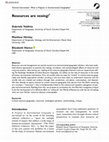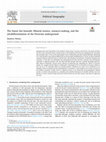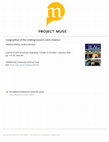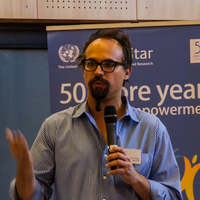Books by Matthew Himley

Mining, Mobility, and Social Change in the Global South: Regional Perspective, 2023
This volume focuses on how, why, under what conditions, and with what effects people move across ... more This volume focuses on how, why, under what conditions, and with what effects people move across space in relation to mining, asking how a focus on spatial mobility can aid scholars and policymakers in understanding the complex relation between mining and social change. This collection centers the concept of mobility to address the diversity of mining-related population movements as well as the agency of people engaged in these movements. This volume opens by introducing both the historical context and conceptual tools for analyzing the mining-mobility nexus, followed by case study chapters focusing on three regions with significant histories of mineral extraction and where mining currently plays an important role in socioeconomic life: the Andes, Central and West Africa, and Melanesia. Written by authors with expertise in diverse fields, including anthropology, development studies, geography, and history, case study chapters address areas of both large-and smallscale mining. They explore the historical-geographical factors shaping mining-related mobilities, the meanings people attach to these movements, and the relations between people's mobility practices and the flows of other things put in motion by mining, including capital, ideas, technologies, and toxic contamination. The result is an important volume that provides fresh insights into the social geographies and spatial politics of extraction. This book will be of great interest to students and scholars of mining and the extractive industries, spatial politics and geography, mobility and migration, development, and the social and environmental dimensions of natural resources more generally.

This Handbook provides an essential guide to the study of resources and their role in socioenviro... more This Handbook provides an essential guide to the study of resources and their role in socioenvironmental change. With original contributions from more than 60 authors with expertise in a wide range of resource types and world regions, it offers a toolkit of conceptual and methodological approaches for documenting, analyzing, and reimagining resources and the worlds with which they are entangled. The volume has an introduction and four thematic sections. The introductory chapter outlines key trajectories for thinking critically with and about resources. Chapters in Section I, "(Un)knowing resources," offer distinct epistemological entry points and approaches for studying resources. Chapters in Section II, "(Un)knowing resource systems," examine the components and logics of the capitalist systems through which resources are made, circulated, consumed, and disposed of, while chapters in Section III, "Doing critical resource geography: Methods, advocacy, and teaching," focus on the practices of critical resource scholarship, exploring the opportunities and challenges of carrying out engaged forms of research and pedagogy. Chapters in Section IV, "Resource-making/world-making," use case studies to illustrate how things are made into resources and how these processes of resource-making transform socioenvironmental life. This vibrant and diverse critical resource scholarship provides an indispensable reference point for researchers, students, and practitioners interested in understanding how resources matter to the world and to the systems, conflicts, and debates that make and remake it.
Articles by Matthew Himley

Geoforum, 2024
Work in political ecology and related fields emphasizes the importance of subjectivities to under... more Work in political ecology and related fields emphasizes the importance of subjectivities to understand power relations and dynamics in nature-society interactions. In practice, though, few studies provide detailed analyses of subject formation. Moreover, the role of subjectivities has remained underexplored in the literature on resource frontiers. This special issue addresses these gaps, exploring processes of subject formation in relation to the material practices, discourses, and governance arrangements of resource extraction in frontier settings. This introductory essay reviews conceptual debates on subjectivities in political ecology and identifies the diverse ways that papers in the issue engage with these debates. It focuses on four thematic areas: 1) subject formation in relation to shifting political economies of extraction; 2) interactions between subject formation "from above" and "from below"; 3) subjectivities and/in emotional geographies; and 4) the spatiotemporal scales of extractive subject formation. The essay concludes by identifying avenues for future research on resource extraction and subjectivities, arguing that a focus on subjectivities can help advance political ecology research across the board.
Journal of Political Ecology, 2023
The other co-authors (c-h) are listed according to relative contribution to the paper. The author... more The other co-authors (c-h) are listed according to relative contribution to the paper. The authors would like to thank two anonymous referees for their suggestions on the article and Simon Batterbury for his editorial support. All remaining omissions or errors are our own.

Progress in Environmental Geography, 2022
Resource use and management are central concerns to environmental geography scholars, who have mo... more Resource use and management are central concerns to environmental geography scholars, who have mobilized diverse approaches to examine the making, circulation, and socioecological effects of resources and resource systems. Informed by our reading of the resource geography literature and our experiences editing The Routledge Handbook of Critical Resource Geography, we reflect on the role of resources in the study of human–environment interactions. First, we outline what we mean by “critical” in critical resource geography and identify approaches scholars working in this area have taken to understand resources and the worlds that are created and undone through their production, circulation, consumption, and disposal. We then identify an aporia internal to critical resource geography that derives from the field's centering of a concept—“resources”—that is fundamentally linked to the colonial and capitalist subjugation of peoples and environments. Building from this, we propose an o...
Political Geography, Jun 1, 2021

Political Geography, May 1, 2021
Engaging with recent scholarship on the relations among science, resources, and territory, this p... more Engaging with recent scholarship on the relations among science, resources, and territory, this paper examines the role of late-nineteenth-century mineral science in the rendering of the Peruvian underground as a knowable and actionable space. I focus on the mineralogical work of Italian-born naturalist Antonio Raimondi, identifying in it a dual dynamic of geo-political differentiation and ontological dedifferentiation. On the one hand, Raimondi constructs Peruvian national territory as distinct due to the abundance and diversity of minerals contained in its subsurface. On the other, his mineralogy was undergirded by the idea that Peru's minerals were ontologically equivalent to minerals anywhere else, and thus knowable through ‘universal’ scientific knowledge practices. Both aspects of Raimondi's mineral science reflected an underlying aim: stimulating the ‘rebirth’ of Peruvian mining. Yet, I suggest that the influence of Raimondi's mineralogical work on the history of resource-making in Peru lay not in its immediate utility for political-economic calculation, but rather in its contribution to an imaginary of Peru as mineral-rich and underexploited. In conclusion, I call attention to the need for research on the political economies of Earth science to approach science as an historically and geographically situated practice, to attend to the multiple (e.g., calculative and symbolic) dimensions of scientific activities, and to be attentive to ways in which the logics and aims of Earth science may not fully intersect with those of capital and the state.

Journal of Latin American Geography, 2020
During the first four decades of CLAG's history, the subterranean received only marginal attentio... more During the first four decades of CLAG's history, the subterranean received only marginal attention in the pages of the organization's publications. The interest that existed centered mainly on the geography of minerals (petroleum included) and mineral production. Especially notable are three ten-year review articles that took the measure of geographical scholarship on Latin American mines and minerals produced during the 1960s (Minkel, 1971), 1970s (Minkel & Smith, 1981), and 1980s (Mower, 1991). All three call attention to the relative lack of geographical research (published in English, at least) on Latin American mineral geography. The reviews also suggest that those few geographers who trained their sights on the region's subsoil resources approached their studies mainly from the perspectives of economic geography, heavily interested, for instance, in the regional development impacts of resource extraction (e.g. Mulchansingh, 1983). Largely absent was a concern for the human costs or cultural politics of extraction, topics that were of increasing interest within cognate fields like anthropology (e.g. Nash, 1979). Overall, the impression one gets from the reviews is that Latin American mineral geography represented an understudied but potentially high-yield area of inquiry: for Clarence Minkel (1971), a "veritable 'gold mine' of opportunity" (p. 212); and for Roland Mower (1991), "a treasure house of Latin American research topics" (p. 209). And yet, in CLAG publications, at least, sustained attention to subsurface resources and their development has only very recently materialized. Spurred by a confluence of factors (free-market policies, elevated commodity prices, rising demand from China and other industrializing countries, among others), subsoil resource extraction rapidly expanded across much of Latin America in the 1990s and early 2000s. Throughout this period, however, CLAG publications remained curiously silent on the topic, a notable exception being Jeffrey Bury and Adam Kolff's (2002) article on mining expansion, livelihood change, and popular protest in the rural Peruvian Andes. Things began to change in the 2010s. Since 2011, at least eighteen articles focused on the socio-ecological dimensions, broadly understood, of mineral, oil, and natural gas extraction have been published in the Journal of Latin American Geography, many of these (though not all; see below) focusing on the contempo

Transactions of the Institute of British Geographers, Jul 18, 2020
In this article we analyse and theorise how power is exercised and subjectivities reworked to ach... more In this article we analyse and theorise how power is exercised and subjectivities reworked to achieve and maintain socio-political order in areas of large-scale international extractive investment. Through a critical review of recent literature on the political ecologies of the international mining and hydrocarbon industries, we explore the strategies that firms and their allies deploy to secure and preserve the transformed relations of land and resource access upon which accumulation relies. Inspired by the work of John Allen we analyse these strategies with attention to the modalities and techniques of power used, highlighting the diverse ways socio-political stability is pursued despite the industry's destabilising effects. What emerges is that, contrasting the sector's reputation for coercion and domination, transformed regimes of access to land and resources at the extractive frontier are to a significant degree achieved and stabilised through what Allen calls the "quieter registers" of power. Attention to the varied and overlapping ways extractive firms and their allies exercise power to secure and maintain access to land and resources highlights limitations to David Harvey's influential accumulation by dispossession framework for understanding how extractive capital circulates into "new ground." It also directs attention to processes of subject formation at the extractive frontier, and to how industry expansion may be facilitated through the production of particular kinds of subjects. To illustrate this, we outline three interrelated ways subjectivities are reworked through peoples' encounters with the logics, materiality, and power of contemporary extractive industry. We suggest that those living in the shadow of large international extractive operations become extractive subjects. K E Y W O R D S accumulation by dispossession, extractive industry, land and resource access, power, subjectivity 1 | INTRODUCTION The extractive frontier is a place of upheaval. As a now sizeable literature on the political ecologies of mineral, oil, and gas development shows, extractive capital moving into "new ground" transforms landscapes, reshapes livelihoods, and often sparks socio-political conflict (e.g.
Latin American Perspectives, Dec 20, 2019
Environment and Planning A, 2014

Geographical Review, Apr 1, 2014
This paper examines how the past is constructed and mobilized within contemporary Peruvian mining... more This paper examines how the past is constructed and mobilized within contemporary Peruvian mining politics. Beginning with an exploration of tensions existing within the mining industry's relationship to its history, I analyze how mining proponents have sought to both naturalize today's mining expansion by locating it within a national history of extraction, while also working to break free from certain negative aspects of the industry's past. The paper then examines how the past is remembered and invoked within the context of on‐the‐ground struggles at a large‐scale gold mine in the region of Ancash. I address the contradictory ways in which local history is constructed in these struggles and document how memories of past experiences with mining inform how area residents understand and critique the “new” mining economy. This paper underscores the need to understand the complicated, selective, and often‐contradictory ways in which the past is made present in extractive industry conflicts.

Antipode, May 18, 2013
: This paper examines the new forms of regulation and resistance accompanying the expanding extr... more : This paper examines the new forms of regulation and resistance accompanying the expanding extractive frontier in Andean Peru. It does so through an analysis of a process of community mobilization at the Pierina gold mine in the region of Ancash that was aimed at transforming the conditions under which area residents labored at the mine. The article documents the complex ways in which the emergence of neoliberalized forms of resource governance has affected the terrain of mining‐related sociopolitical struggle at Pierina, both allowing the mining firm to consolidate authority in the arena of mine–community relations, while also establishing certain conditions for residents to pursue their interests collectively. An analysis of the Pierina case suggests that efforts to forge more just and equitable political economies of mineral development must not only challenge the neoliberalization of resource governance, but also confront the underlying socio‐ecological contradictions of contemporary capitalist resource development.
Apuntes: Revista de Ciencias Sociales, 2011
El género y la edad frente a las reconfiguraciones en los medios de subsistencia originadas por l... more El género y la edad frente a las reconfiguraciones en los medios de subsistencia originadas por la minería

Sustainability, Oct 18, 2010
As transnational mining firms have sought to position themselves as drivers of sustainable develo... more As transnational mining firms have sought to position themselves as drivers of sustainable development, a key component of their efforts has been the implementation of social development programs in their areas of operation. This paper situates the expansion of corporate-led development in the mining sector as part of an ongoing reconfiguration of the frameworks and processes through which mineral production is governed, interpreting such initiatives as illustrative of "roll-out" neoliberalization. Based on an analysis of firm-led development at the Pierina gold mine in Andean Peru, I explore how the mining company has been able to advance a version of sustainability broadly compatible with contemporary large-scale mining. Taking on the role of development agent, however, is not an uncomplicated endeavor in that it has left the firm subject to escalating development claims from nearby populations. In this context, I raise the question of whether the mining industry's adoption of notions of partnership and participation amounts to a strategy for diffusing responsibility when necessary and deflecting the claims of affected communities.
Geoforum, Sep 1, 2009
The Ecuadorian sierra, or Andean region, has during recent decades witnessed a marked expansion o... more The Ecuadorian sierra, or Andean region, has during recent decades witnessed a marked expansion of nature conservation initiatives. This paper explores the relations and tensions between this proliferation of conservation interventions and the struggles of rural Andean communities to assert territorial authority and to consolidate their livelihoods. Through an analysis of three rounds of conservation initiatives in an indigenous campesino cooperative in the south-central sierra, I argue for a conceptualization of the outcomes and trajectories of conservation as coproduced through histories of interaction between conservation actors and rural resource users. Within this analytical framework, I underscore the importance of taking into account the agency of rural communities, their historical landscape claims, and the dynamism of their livelihood interests.
Chapters by Matthew Himley
The Routledge Handbook of Critical Resource Geography, 2021
A Research Agenda for Environmental Geopolitics, Feb 3, 2020
The International Encyclopedia of Geography, Mar 6, 2017











Uploads
Books by Matthew Himley
Articles by Matthew Himley
Chapters by Matthew Himley